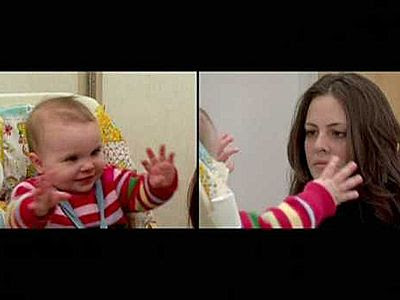
In Bible class, this past Sunday, we talked about how humans develop trust. This goes back to our first few months of life outside the womb and marks the establishment of attachment. We saw a clip of Dr. Edward Tronick's "still face experiment." In this clip a baby and mother engage in typical communication until the mother is instructed to make her face still; to not react to the baby in any way. At this point we study the baby's reaction. She tries everything she knows to get a response from her mother and when nothing works, distress settles in. At about the time I can't stand it anymore, the mother relents and responds to the baby.
This is the typical reaction of babies with a healthy attachment to their parents. These babies have developed patterns of behavior based on the understanding that a parent will react. This is the first thing that is learned in order for a baby to develop socially, emotionally and in language. A baby without a healthy attachment would respond very differently to a still-face mother. These babies have not developed a trust that someone will respond. This creates a scar that prevents most other healthy learning.
Our discussion topic, surrounding this clip, was about trust. When God teaches us to trust we are able to engage in a relationship with Him. As with the mother and child, God does the work in this relationship. He is the one who engages, teaches and responds. Furthermore, He does so perfectly, knowing exactly what we need and when we need it. We are welcome to cry out to Him, however, He has already anticipated both our pain and our needs.
Likewise the Spirit helps us in our weakness. For we do not know what to pray for as we ought, but the Spirit himself intercedes for us with groanings too deep for words. Romans 8:26 (ESV)
We are babies, buckled into a car seat facing our Heavenly Father. We cry, we squirm, we try to draw God's attention; all the time He looks at us in love and understanding. Trust is knowing that God has a plan for our life. Trust is knowing that God can bring good out of anything. Trust is knowing that He will provide what we need, as we need it. Trust is knowing that God has already accomplished all we need or could ever want.
And know this: God never looks at us with a still face.
So that Christ may dwell in your hearts through faith—that you, being rooted and grounded in love, may have strength to comprehend with all the saints what is the breadth and length and height and depth, and to know the love of Christ that surpasses knowledge, that you may be filled with all the fullness of God. Ephesians 3: 17-19 (ESV)
Continue your day with the peace-filled knowledge that God blesses you with trust and always looks at you with love, mercy and peace. You are His precious child.

